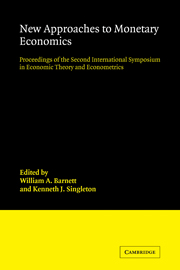 New Approaches to Monetary Economics
New Approaches to Monetary Economics Published online by Cambridge University Press: 04 August 2010
In this paper, I discuss two policy questions which I regard as unresolved: Should interest be paid on money and should currency provision be in the hands of the government? An affirmative answer to the first question stands as one of the few widely accepted general results of monetary theory. My discussion is intended to cast doubt on it. There is no widely accepted answer to the second question; some have asserted that currency provision is a public good while others have asserted that currency provision should be left to the market. My discussion of currency provision will not provide a resolution. Instead, I will discuss a way of formulating the question that seems to offer some hope for resolving it.
Payment of interest on money
The casual statement on the case for paying interest on money is familiar. Real balances are produced at zero social cost. In an equilibrium in which the real yield on other assets exceeds that on money – or, more generally, in which the marginal rate of substitution between future consumption and present consumption exceeds the real return on money – individuals face a positive alternative cost of holding money. Given the zero social cost, this positive alternative cost implies that too little money is being held. Payment of interest on money removes the positive alternative cost. I focus on one aspect of this casual statement: How does an equilibrium arise with a real return on money less than the relevant intertemporal marginal rate of substitution?
To save this book to your Kindle, first ensure no-reply@cambridge.org is added to your Approved Personal Document E-mail List under your Personal Document Settings on the Manage Your Content and Devices page of your Amazon account. Then enter the ‘name’ part of your Kindle email address below. Find out more about saving to your Kindle.
Note you can select to save to either the @free.kindle.com or @kindle.com variations. ‘@free.kindle.com’ emails are free but can only be saved to your device when it is connected to wi-fi. ‘@kindle.com’ emails can be delivered even when you are not connected to wi-fi, but note that service fees apply.
Find out more about the Kindle Personal Document Service.
To save content items to your account, please confirm that you agree to abide by our usage policies. If this is the first time you use this feature, you will be asked to authorise Cambridge Core to connect with your account. Find out more about saving content to Dropbox.
To save content items to your account, please confirm that you agree to abide by our usage policies. If this is the first time you use this feature, you will be asked to authorise Cambridge Core to connect with your account. Find out more about saving content to Google Drive.